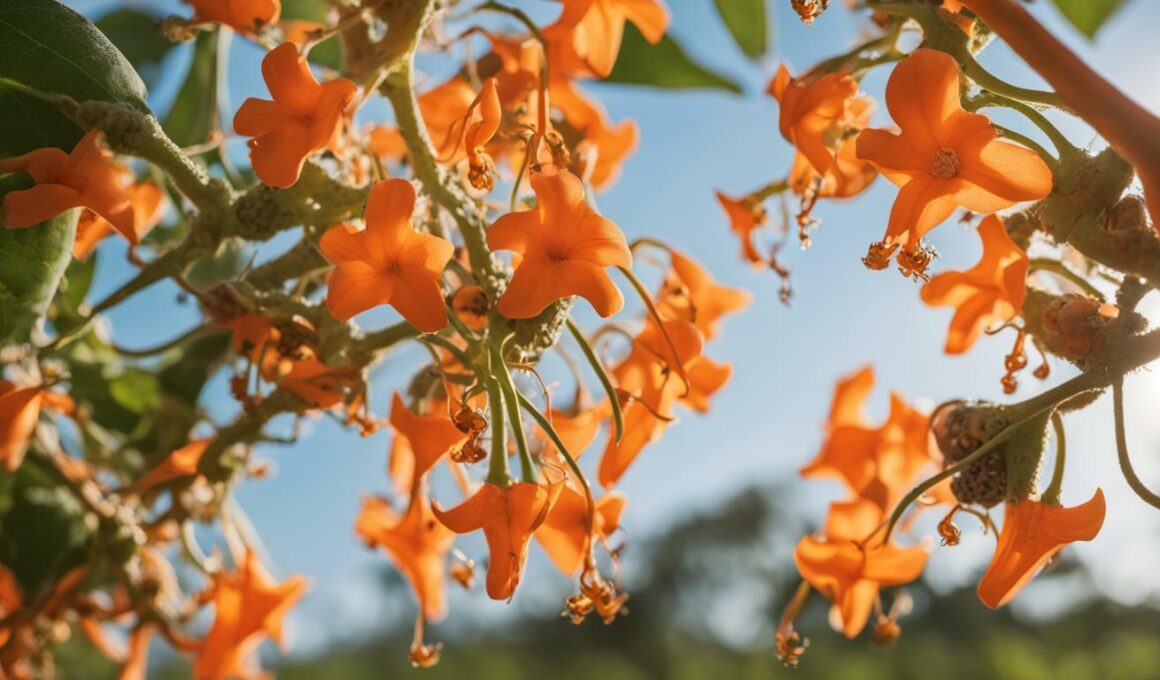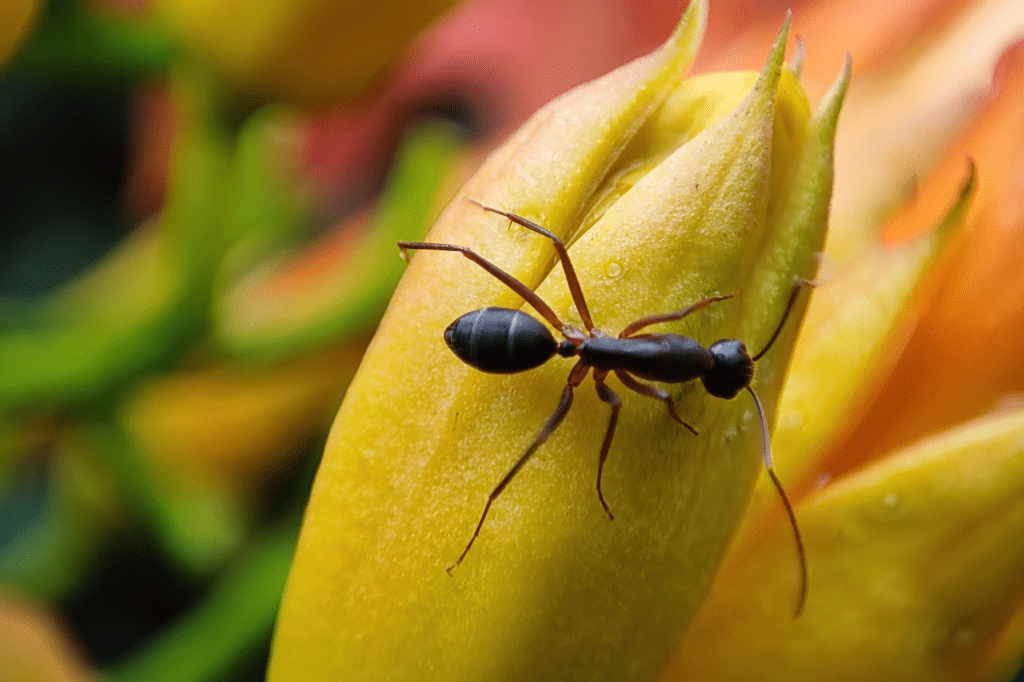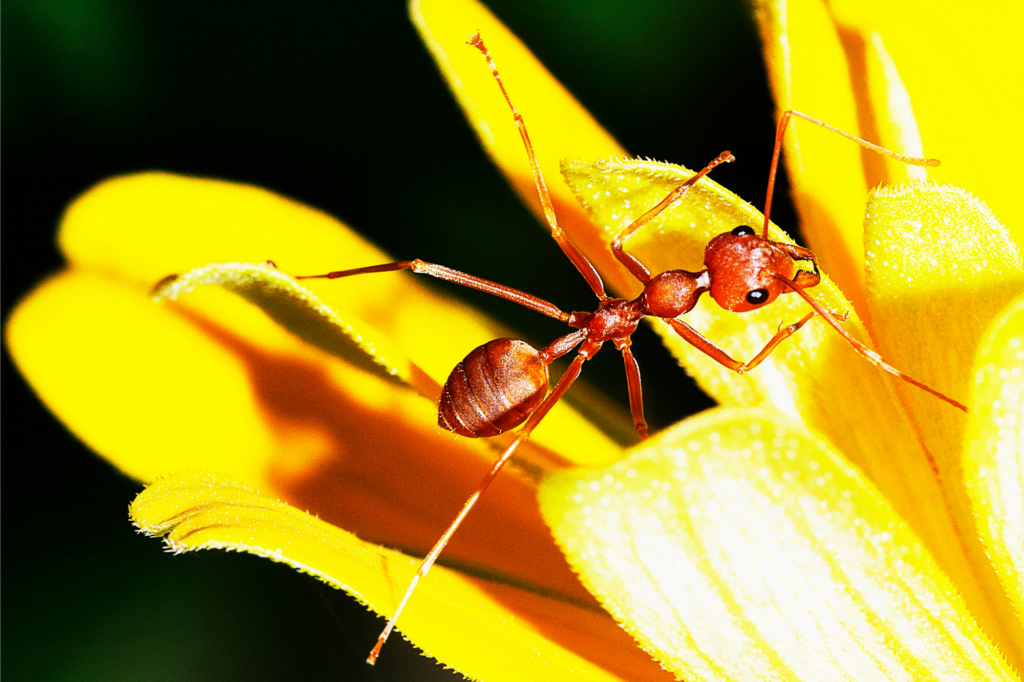Are you frustrated with ants taking over your beautiful trumpet vine? Not only can it be unsightly, but these pesky insects can cause damage to your beloved plant. It’s important to understand why ants are attracted to trumpet vines in order to effectively deal with the problem and protect your vine.
Ants are often drawn to the sweet nectar produced by the trumpet vine’s flowers and the sticky residue left behind by aphids, which are commonly found on the vine. Unfortunately, this attraction can lead to harmful consequences for your plant.
Post Summary:
- Understanding why ants are attracted to trumpet vines is crucial for effective pest control.
- Ants protect aphids, which can harm the vine by feeding on its sap.
- Ants can also disrupt the vine’s root system and nutrient uptake by creating tunnels in the soil.
Understanding Ant Behavior on Trumpet Vines
Are you wondering why ants are all over your beautiful trumpet vine? Understanding the behavior of ants on trumpet vines is crucial in effectively dealing with an ant infestation.
Ants are attracted to trumpet vines because of the sweet nectar produced by the vine’s flowers. Additionally, aphids are often found on the vine, producing a sugary, sticky residue. Ants and aphids have a symbiotic relationship – ants protect the aphids and, in turn, feed on their honeydew excretions.
When ants infest a trumpet vine, they can cause serious damage. Ants protect aphids, which can harm the vine by feeding on its sap. The tunnels created by ants in the soil around the vine can also disrupt its root system and nutrient uptake.
Identifying Ant Species on Trumpet Vines
There are several ant species commonly found on trumpet vines, including Argentine ants, carpenter ants, and pavement ants. Argentine ants are known for their affinity for trumpet vines and can have a significant impact on the plant’s health. Carpenter ants, while not typically associated with trumpet vines, can tunnel through the plant’s wood and cause significant damage.
It’s important to be able to identify these ants in order to choose the appropriate course of action for ant control on your trumpet vine.
The Impact of Ants on Trumpet Vines
Ants can cause significant damage to your trumpet vine and harm its growth. Ants protect aphids, which feed on the sap of the vine. The aphids excrete honeydew, a sugary substance that ants find irresistible. Ants will defend the aphids from predators and move them around to new locations on the vine, spreading the infestation.
This symbiotic relationship can lead to a massive infestation, causing damage to your plant and making it unappealing for enjoyment.
Additionally, ants tunnel in the soil around the vine, creating air pockets that block the absorption of moisture and nutrients vital to your trumpet vine’s growth.
Identifying Ant Species on Trumpet Vines
Ants are a common sight on trumpet vines, but not all species are created equal. It’s important to identify the specific species infesting your trumpet vine to effectively deal with the problem. Here are some common ant species that are attracted to trumpet vines:
| Ant Species | Description |
|---|---|
| Argentine Ants | These ants are small and brown and are commonly found in Southern California. They are attracted to the sweet nectar produced by trumpet vine flowers and can cause damage to the vine. |
| Carpenter Ants | These ants are black and larger than Argentine ants. They can cause significant damage to trumpet vines by creating tunnels in the wood, which weakens the plant and makes it more susceptible to disease. |
| Pavement Ants | These ants are small and brown and are often found in pavement cracks. They are attracted to the sticky residue left by aphids on trumpet vines and can protect the aphids from natural predators. |
If you’re unsure of which ant species is causing problems on your trumpet vine, reach out to your local pest control expert for identification and treatment recommendations.
Natural Methods to Repel Ants from Trumpet Vines
If you’re looking for natural and safe ways to get rid of ants on your trumpet vine, try these tips:
- Use vinegar solution: Mix equal parts of vinegar and water in a spray bottle and apply it directly to the ants and their trails. Repeat every few days until the ants are gone.
- Create physical barriers: Place a band of sticky tape or petroleum jelly around the base of the trumpet vine’s trunk to stop ants from climbing up.
- Citrus-based sprays: You can also use citrus-based sprays by boiling orange or lemon peels in water for 10 minutes and allowing it to cool. Pour the solution into a spray bottle and apply it directly to the ants and their trails.
- Introduce beneficial insects: Encourage beneficial insects, such as ladybugs, lacewings, and praying mantises to your garden. They eat the aphids that produce the sticky residue, which in turn, reduces the attraction for the ants.
Before applying any treatment, ensure that you test it first on a small area to see if it affects the trumpet vine negatively.
Chemical Solutions for Ant Control on Trumpet Vines
If natural methods don’t work for you, chemical solutions are also available to eliminate ants on your trumpet vine. Ant baits, sprays, and granules are among the most commonly used chemical products for ant control.
Ant baits work by attracting ants with a sweet or protein-based bait that contains a slow-acting toxicant. The ants take the bait back to their colony, where it eventually kills the entire colony.
Ant sprays and granules are designed to kill ants on contact. They contain insecticides such as pyrethroids or neonicotinoids that attack the nervous system of ants.
However, it’s important to use these products responsibly, as they can also harm beneficial insects and pollinators in your garden. Follow the instructions provided by the manufacturer carefully and avoid applying the products on windy days or when bees and other pollinators are active.
Preventing Ants on Trumpet Vines
Now that you know the behavior of ants on trumpet vines and the potential damage they can cause, it’s time to take preventive measures. Here are some tips to keep ants away from your trumpet vines.
- Regular pruning: Remove any aphid-infested parts of the vine. This will reduce the amount of sticky residue that attracts ants to the area.
- Cleanliness: Keep the area around the vine clean and free of debris. Ants are attracted to food and water, so remove any fallen fruit or standing water.
- Promote a healthy ecosystem: Introduce beneficial insects like ladybugs and lacewings to control aphid populations. Encourage a diverse garden ecosystem by planting a variety of flowers and plants.
By implementing these preventive measures, you can help ensure a healthy trumpet vine free of ant infestations. Remember, understanding the behavior of ants on trumpet vines is key to effective pest control.
Conclusion
In conclusion, dealing with ants on your trumpet vine can be frustrating, but it’s important to understand their behavior to effectively address the problem. Ants are attracted to the sweet nectar produced by the flowers and the sticky residue left by aphids. This symbiotic relationship can harm your trumpet vine as ants protect aphids which can feed on the sap and damage the vine.
There are both natural and chemical solutions available to control ant infestations on your trumpet vine. Using natural methods like vinegar or citrus-based sprays or introducing beneficial insects can help repel ants. Chemical solutions like ant baits or sprays can effectively eliminate ants, but it’s vital to use these products responsibly.
Preventive measures like regular pruning, keeping the area around the vine clean, and promoting a healthy garden ecosystem can also help keep ants away from your trumpet vine. By implementing these measures and understanding ant behavior, you can maintain a healthy, thriving trumpet vine. Take action now to protect your trumpet vine from ants and enjoy its beauty for years to come.
FAQ
Q: Why are there ants all over my Trumpet Vine?
A: Ants are attracted to Trumpet Vines because of the sweet nectar produced by their flowers and the sticky residue left behind by aphids, which are often found on the vine.
Q: What is the impact of ants on Trumpet Vines?
A: Ants can protect aphids, which can harm the vine by feeding on its sap. Additionally, ants create tunnels in the soil around the vine, which can disrupt its root system and nutrient uptake.
Q: How can I repel ants from my Trumpet Vine using natural methods?
A: You can repel ants from your Trumpet Vine by using vinegar or citrus-based sprays, creating physical barriers, and introducing beneficial insects.
Q: Are there chemical solutions for ant control on Trumpet Vines?
A: Yes, there are chemical options available for controlling ant infestations on Trumpet Vines, such as ant baits, sprays, or granules. It is important to follow instructions and use these products responsibly.
Q: How can I prevent ants from infesting my Trumpet Vine?
A: To prevent ants on your Trumpet Vine, regularly prune to remove aphid-infested parts, keep the area around the vine clean and free of debris, and promote a healthy overall garden ecosystem.











